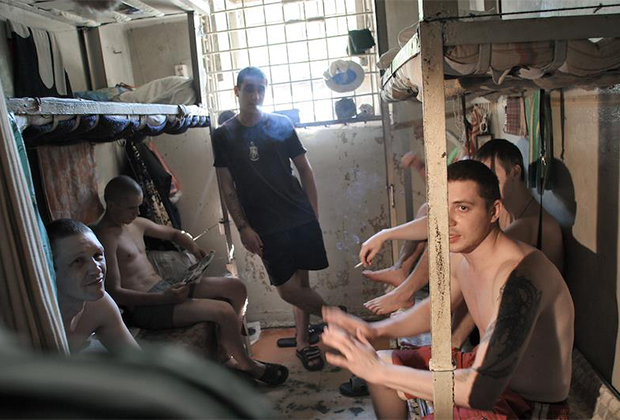Kremlin has a problem. Since it didn't declare war, it can't jail the military who just refuse to go to fight to Ukraine. But senior officers can add bad remarks to their personal files. Like this:
"Inclined towards alcohol and drug abuse, towards theft and anal orgies"
"Inclined towards alcohol and drug abuse, towards theft and anal orgies"

Last remark about "anal orgies" is very illustrative. It's not so much about homophobia as a Westerner could presume as about the prison culture. Prison culture permeates society, especially the army, police and state security *far* deeper than foreigners would believe 

Prison has very complex sexual code. First and most importantly, *active* homosexualism is okay. It's not even perceived as homosexualism, but as a way to reinforce the social hierarchy. Passive role though is shameful and is reserved for the non-touchable, the "cocks" (петухи) 

To become a cock you need to be "moved down" (gang raped, usually). Now you become a non touchable. Nobody can touch you except for sex, otherwise they also become the ritually unclean (законтачиться). If they want to beat you, they should do it with legs, not by hands
Social hierarchy has a spatial dimension. The cocks get their own place in the prison canteen so that normal ones can avoid contact with them. They must sleep near the toilet, ideally on the floor. They get a special spoon with a hole, marking their outcast status 

Why do I discuss a fringe topic so meticulously, you may ask? Because it is not fringe. Prison culture shapes the Russian public discourse. Consider Lavrov who "mocked" the French pointing out to their national symbol. A very witty observation, apparently
ria.ru/20220303/frant…
ria.ru/20220303/frant…

When Lavrov looks at the Gallic rooster, first thing he thinks about is a prison cock. Why? Because he is deeply influenced by the prison culture, as nearly 100% of the Russian ruling class. Prison culture defines their thinking and behaviour, they just can't think in other terms 

Prison culture largely defines the modern Russia. You can't understand its discourse, its sociopolitical hierarchy, its economy, if you don't take into account the deep effect of prison values on how the Russian society works. Russian ruling elites think in prison terms, too 

I strongly recommend this drama of 1989, "Беспредел". It's only in Russian but I hope someone will add the English subtitles. I will argue that you can't get how either Russian politics or economy work without understanding such basics as pictured here
Regarding the initial photo, I took its from a Telegram channel "Military ombudsman". Basically he is a lawyer who helps the Russian military to sue the higher ups or to defend from their lawsuits. Since February he seems to be buried under work. The end
t.me/military_ombud…
t.me/military_ombud…
PS A political prisoner Ivan Astashin produced a very succinct but good description of the prison sexual code here. It's in Russian but you can google translate it. It gives good understanding about a system of values, set of taboos, etc
vk.com/@delo_abto-tur…
vk.com/@delo_abto-tur…
• • •
Missing some Tweet in this thread? You can try to
force a refresh





